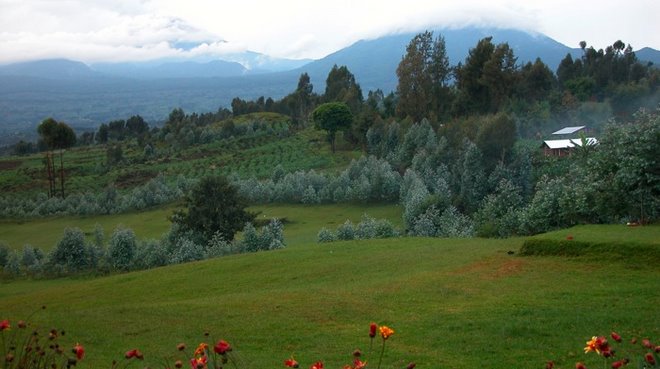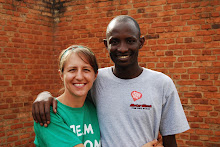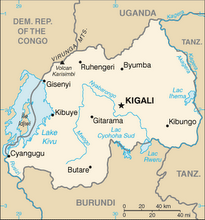"We think that if Jesus compels us to do something and we are obedient to Him, He will lead us to great success. We should never have thought that our dreams of success are God's purposes for us. In fact, His purpose may be the exact opposite. We have the idea that God is leading us toward a particular end or a desired goal, but He is not. The question of whether or not we arrive at a particular goal is of little importance and reaching it only comes merely as an episode along the way. What we see as only the process of reaching a particular end, God sees as the goal itself... His purpose is the process itself."
~Oswald Chambers
Saturday, August 25, 2007
Wednesday, August 22, 2007
Deeper Appreciation.
 What a blessing it is to have friends and family come visit you. For the last month Mike came to visit me and it was so great to have someone from home here to see and experience my life in Rwanda. It can definitely be an adjustment for people when they come because life here is much different then the one we live in the U.S. It takes time to warm up to people, to get use to being stared at, and constantly asked for money. There is no chicken here, so almost everything you order is either vegetarian or made with beef. Also, we do not have the luxury of a washing machine or dryer so laundry is always done by hand and hung on a line. Adjusting to life here just takes time. I think the best part of it all is that when people finally do return home they see life a little differently. Through a new perspective and they have a deeper appreciation for the things they have and have access too.
What a blessing it is to have friends and family come visit you. For the last month Mike came to visit me and it was so great to have someone from home here to see and experience my life in Rwanda. It can definitely be an adjustment for people when they come because life here is much different then the one we live in the U.S. It takes time to warm up to people, to get use to being stared at, and constantly asked for money. There is no chicken here, so almost everything you order is either vegetarian or made with beef. Also, we do not have the luxury of a washing machine or dryer so laundry is always done by hand and hung on a line. Adjusting to life here just takes time. I think the best part of it all is that when people finally do return home they see life a little differently. Through a new perspective and they have a deeper appreciation for the things they have and have access too.
Home.
 Some of the hardest things about being overseas and living in Rwanda is missing some of the familiarities, comforts, and people from home. When you are away and cannot come home for a long time you miss out on weddings, nephews growing up, and family. Some times it is easy to get through and some times it near breaks your heart. Life here is great and God is moving and working, but some times there is no place like home and the familiarity of people who really know you and love you.
Some of the hardest things about being overseas and living in Rwanda is missing some of the familiarities, comforts, and people from home. When you are away and cannot come home for a long time you miss out on weddings, nephews growing up, and family. Some times it is easy to get through and some times it near breaks your heart. Life here is great and God is moving and working, but some times there is no place like home and the familiarity of people who really know you and love you.
Friday, August 03, 2007
Tap Water.
My Friend Mike's thoughts... I think he is on to something. It really is interesting how we take our clean tap water for granted, especially when you would be caught dead drinking out of the tap water here in Rwanda let alone collecting water from the sewer, which much of the Rwanda population does here. To them water is water whether it is coming from the sewer or not. For those who do that they are just desperate for water even though they know it will make them sick even after they take it home and boil it.
Thoughts and article from Mike:
We Americans take tap water for granted. As I watch people take water from the sewers it reminds me how good we have it. We open the tap and we drink the water - costing just pennies. Here's an article from the NY Times recently:
August 1, 2007
Editorial
In Praise of Tap Water
On the streets of New York or Denver or San Mateo this summer, it seems the telltale cap of a water bottle is sticking out of every other satchel. Americans are increasingly thirsty for what is billed as the healthiest, and often most expensive, water on the grocery shelf. But this country has some of the best public water supplies in the world. Instead of consuming four billion gallons of water a year in individual-sized bottles, we need to start thinking about what all those bottles are doing to the planet’s health.
Here are the hard, dry facts: Yes, drinking water is a good thing, far better than buying soft drinks, or liquid candy, as nutritionists like to call it. And almost all municipal water in America is so good that nobody needs to import a single bottle from Italy or France or the Fiji Islands. Meanwhile, if you choose to get your recommended eight glasses a day from bottled water, you could spend up to $1,400 annually. The same amount of tap water would cost about 49 cents.
Next, there’s the environment. Water bottles, like other containers, are made from natural gas and petroleum. The Earth Policy Institute in Washington has estimated that it takes about 1.5 million barrels of oil to make the water bottles Americans use each year. That could fuel 100,000 cars a year instead. And, only about 23 percent of those bottles are recycled, in part because water bottles are often not included in local redemption plans that accept beer and soda cans. Add in the substantial amount of fuel used in transporting water, which is extremely heavy, and the impact on the environment is anything but refreshing.
Tap water may now be the equal of bottled water, but that could change. The more the wealthy opt out of drinking tap water, the less political support there will be for investing in maintaining America’s public water supply. That would be a serious loss. Access to cheap, clean water is basic to the nation’s health.
Some local governments have begun to fight back. Earlier this summer, San Francisco Mayor Gavin Newsom prohibited his city’s departments and agencies from buying bottled water, noting that San Francisco water is “some of the most pristine on the planet.” Salt Lake City has issued a similar decree, and New York City recently began an advertising campaign that touted its water as “clean,” “zero sugar” and even “stain free.”
The real change, though, will come when millions of ordinary consumers realize that they can save money, and save the planet, by turning in their water bottles and turning on the tap.
Thoughts and article from Mike:
We Americans take tap water for granted. As I watch people take water from the sewers it reminds me how good we have it. We open the tap and we drink the water - costing just pennies. Here's an article from the NY Times recently:
August 1, 2007
Editorial
In Praise of Tap Water
On the streets of New York or Denver or San Mateo this summer, it seems the telltale cap of a water bottle is sticking out of every other satchel. Americans are increasingly thirsty for what is billed as the healthiest, and often most expensive, water on the grocery shelf. But this country has some of the best public water supplies in the world. Instead of consuming four billion gallons of water a year in individual-sized bottles, we need to start thinking about what all those bottles are doing to the planet’s health.
Here are the hard, dry facts: Yes, drinking water is a good thing, far better than buying soft drinks, or liquid candy, as nutritionists like to call it. And almost all municipal water in America is so good that nobody needs to import a single bottle from Italy or France or the Fiji Islands. Meanwhile, if you choose to get your recommended eight glasses a day from bottled water, you could spend up to $1,400 annually. The same amount of tap water would cost about 49 cents.
Next, there’s the environment. Water bottles, like other containers, are made from natural gas and petroleum. The Earth Policy Institute in Washington has estimated that it takes about 1.5 million barrels of oil to make the water bottles Americans use each year. That could fuel 100,000 cars a year instead. And, only about 23 percent of those bottles are recycled, in part because water bottles are often not included in local redemption plans that accept beer and soda cans. Add in the substantial amount of fuel used in transporting water, which is extremely heavy, and the impact on the environment is anything but refreshing.
Tap water may now be the equal of bottled water, but that could change. The more the wealthy opt out of drinking tap water, the less political support there will be for investing in maintaining America’s public water supply. That would be a serious loss. Access to cheap, clean water is basic to the nation’s health.
Some local governments have begun to fight back. Earlier this summer, San Francisco Mayor Gavin Newsom prohibited his city’s departments and agencies from buying bottled water, noting that San Francisco water is “some of the most pristine on the planet.” Salt Lake City has issued a similar decree, and New York City recently began an advertising campaign that touted its water as “clean,” “zero sugar” and even “stain free.”
The real change, though, will come when millions of ordinary consumers realize that they can save money, and save the planet, by turning in their water bottles and turning on the tap.
Somebodies Trash is Someones Treasure.
 It has been a long wait, but finally all of the boys, except for two who have really big feet, have cleats!!! This is a BIG deal considering that these boys have been playing barefooted or in sandals for the last few months or even year. For one player, Vino, he had a pair of cleats, but they were not what we would consider comfortable. One day I noticed that he kept taking his cleats on and off and he was even limping when they were on. I asked him about it and then felt where his toe was to see how tight they were. To my surprise, his cleat must have been two sizes two small! I was appalled. It was through Vino and me watching them run around barefooted in a field with sharp rocks and other trash that I realized I needed to do something. They were so excited!! They kept saying "thank you coach, thank you coach." It made me laugh. I mean the cleats they received were nothing like the cleats we have in the U.S. If anything the cleats they received I bought from the market where most of our used and goodwill/ salvation army clothing goes when it cannot sell in the U.S. If anything each pair was a little worn down, had a slight smell to them, but they were completely functional. It made me think once again how for some of us what we consider to be trash just happens to be someone elses treasure.
It has been a long wait, but finally all of the boys, except for two who have really big feet, have cleats!!! This is a BIG deal considering that these boys have been playing barefooted or in sandals for the last few months or even year. For one player, Vino, he had a pair of cleats, but they were not what we would consider comfortable. One day I noticed that he kept taking his cleats on and off and he was even limping when they were on. I asked him about it and then felt where his toe was to see how tight they were. To my surprise, his cleat must have been two sizes two small! I was appalled. It was through Vino and me watching them run around barefooted in a field with sharp rocks and other trash that I realized I needed to do something. They were so excited!! They kept saying "thank you coach, thank you coach." It made me laugh. I mean the cleats they received were nothing like the cleats we have in the U.S. If anything the cleats they received I bought from the market where most of our used and goodwill/ salvation army clothing goes when it cannot sell in the U.S. If anything each pair was a little worn down, had a slight smell to them, but they were completely functional. It made me think once again how for some of us what we consider to be trash just happens to be someone elses treasure.
Much to Celebrate.

 On Sundays I meet Emerthe and about twenty girls ranging in age from about 10 to 16 who either live on the street or who have found temporary homes. These girls hardly speak any English and often laugh at me when ever I speak or do anything. Last Sunday was a BIG day. It was the first time for me to actually instruct them in soccer and they received cloth donations from some girls from the Netherlands. It was like Christmas. During soccer I just had them do a few passing drills and had them work on controlling the ball. Many of the girls just laughed at each other. Plus, trying to play soccer in sandals is quite the challenge, so I think they will be better once they finally receive a pair of sneakers. After practice we distributed clothing. Each girl was able to receive two items, either a pair of pants and a shirt or a sweatshirt and a shirt. It can get very cold at night here, so many of the girls do not have something to cover themselves with. The girls were very excited to receive their clothing since it will be one of the few things they own. Another celebration will come in the next week or so when they each receive a pair of shoes. Through the fundraising done in the U.S. I was able to contribute 33,000 franks, which is about $66 USD or about $3 per pair of shoes. Only 11 out of the twenty girls will receive shoes, but it is a start and at least some of them will be able to play soccer with closed-toed shoes. The other girls, Emerthe, Odette, and I are really hoping to find funding to create a sowing shop. We are currently in the process of submitting a proposal to the Netherlands government who is interested in helping to fund the sowing project for one year and get it off it's feet.
On Sundays I meet Emerthe and about twenty girls ranging in age from about 10 to 16 who either live on the street or who have found temporary homes. These girls hardly speak any English and often laugh at me when ever I speak or do anything. Last Sunday was a BIG day. It was the first time for me to actually instruct them in soccer and they received cloth donations from some girls from the Netherlands. It was like Christmas. During soccer I just had them do a few passing drills and had them work on controlling the ball. Many of the girls just laughed at each other. Plus, trying to play soccer in sandals is quite the challenge, so I think they will be better once they finally receive a pair of sneakers. After practice we distributed clothing. Each girl was able to receive two items, either a pair of pants and a shirt or a sweatshirt and a shirt. It can get very cold at night here, so many of the girls do not have something to cover themselves with. The girls were very excited to receive their clothing since it will be one of the few things they own. Another celebration will come in the next week or so when they each receive a pair of shoes. Through the fundraising done in the U.S. I was able to contribute 33,000 franks, which is about $66 USD or about $3 per pair of shoes. Only 11 out of the twenty girls will receive shoes, but it is a start and at least some of them will be able to play soccer with closed-toed shoes. The other girls, Emerthe, Odette, and I are really hoping to find funding to create a sowing shop. We are currently in the process of submitting a proposal to the Netherlands government who is interested in helping to fund the sowing project for one year and get it off it's feet.
Subscribe to:
Posts (Atom)










